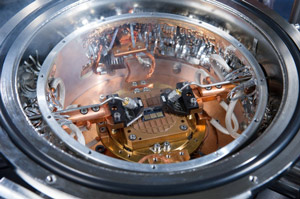- News
19 February 2014
IHP and Georgia Tech demo record-speed silicon-based device
A research collaboration between the German government-funded research center IHP-Innovations for High Performance Microelectronics in Frankfurt (Oder) and the USA’s Georgia Institute of Technology has demonstrated what is claimed to be the fastest silicon-based device to date: a silicon-germanium (SiGe) transistor operated at 798GHz fMAX (P.S Chakraborty et al, IEEE Electron Device Letters, February issue; DOI 10.1109/LED.2013.2295214). This exceeds the previous record for SiGe chips by about 200GHz.
Although the record speed was achieved at an extremely cold temperature of 4.3K, the research suggests that record speeds at room temperature are not far off, says professor John D. Cressler, who led the research for Georgia Tech.
“The transistor we tested was a conservative design, and the results indicate that there is significant potential to achieve similar speeds at room temperature – which would enable potentially world-changing progress in high-data-rate wireless and wired communications, as well as signal processing, imaging, sensing and radar applications,” believes Cressler, who holds the Schlumberger Chair in electronics in Georgia Tech’s School of Electrical and Computer Engineering. “These results also indicate that the goal of breaking the so-called ‘terahertz barrier’ – meaning, achieving terahertz speeds in a robust and manufacturable silicon-germanium transistor – is within reach,” he adds.
Cressler says that the tested transistor itself could be practical as-is for certain cold-temperature applications. In particular, it could be used in its present form for demanding electronics applications in outer space, where temperatures can be extremely low.
 Picture: SiGe chips and measurement probes inside cryogenic probe station in Georgia Tech lab. (Georgia Tech; photo, Rob Felt.)
Picture: SiGe chips and measurement probes inside cryogenic probe station in Georgia Tech lab. (Georgia Tech; photo, Rob Felt.)
IHP designed and fabricated the heterojunction bipolar transistor (HBT) from nanoscale SiGe alloy embedded within a silicon transistor. Cressler and his Georgia Tech team, including graduate students Partha S. Chakraborty, Adilson Cordoso and Brian R. Wier, performed the work of analyzing, testing and evaluating it.
“The record low-temperature results show the potential for further increasing the transistor speed toward terahertz (THz) at room temperature,” says Bernd Tillack, who is leading the technology department at IHP. “This could help enable applications of Si-based technologies in areas in which compound semiconductor technologies are dominant today,” he adds. “At IHP, B. Heinemann, H. Rücker, and A. Fox – supported by the whole technology team – are working to develop the next THz transistor generation.”
Silicon cannot compete with other materials regarding the extremely high performance needed for certain types of emerging wireless and wired communications, signal processing, radar and other applications, note the researchers. More costly materials including indium phosphide, gallium arsenide and gallium nitride currently dominate such demanding applications.
However, SiGe devices such as IHP’s 800GHz transistor combine SiGe’s extremely high performance with silicon’s traditional advantages – low cost, high yield, smaller size and high levels of integration and manufacturability – making them competitive with the other materials. The new transistor has a breakdown voltage of 1.7V, a value which is adequate for most intended applications.
The 800GHz transistor was manufactured using IHP’s 130nm BiCMOS process, which has a cost advantage compared with existing highly scaled CMOS silicon technologies. The 130nm SiGe BiCMOS process is offered by IHP in a multi-project wafer foundry service.
The Georgia Tech team used liquid helium to achieve the low cryogenic temperatures of 4.3K. “When we tested the IHP 800GHz transistor at room temperature during our evaluation, it operated at 417GHz,” says Cressler. “At that speed, it is already faster than 98% of all the transistors available right now.”
DOTFIVE presents high-speed SiGe HBTs at ISSCC
EU's DOTFIVE project to boost SiGe HBTs from 300GHz to 0.5THz
SiGe HBT sets new record above 500 GHz
http://ieeexplore.ieee.org/xpl/login.jsp?tp=&arnumber=6701335


